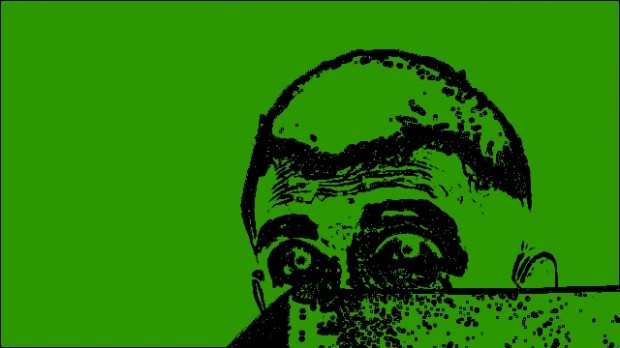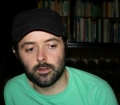You have no items in your cart. Want to get some nice things?
Go shopping
The following is taken from the notebook of the Argentine writer Josep Ricardo Zanetti de Silva, dated 11th February 2007.
“You will not believe that which you are about to read. I can scarcely believe it myself, or keep the pen from shaking in my hand. However, the following is a precise record of what happened to me today – I swear on all that I hold true. And, since I do not know what will happen next, this must exist as a record. Just in case.
Let us start at 9.30 this morning: after a simple breakfast at home followed by some fruit from one of San Remo’s street stalls, I decided on a whim to go for a wander. Initially, I had promised to give the day to work, but I am of the view that time for thinking is as important as anything else, and a stroll along the shaded pavements of the city is excellent for this. So I weaved down cobbled streets, the heat of the day just beginning. I intended to branch out from my habit of ending up at the same cafe, Clasicà y Moderna, but the intention was weak and the lure of the stylish old book and coffee shop was strong. And we are creatures of habit, after all.
My arrival was unnoticed. The usual handful of customers sat at tables or roamed the corridors between the high-stacked shelves, and the ancient resident pianist was already fluttering his hands over the keys. I found a small table by the window.
Listening to the music, sipping my coffee and glancing idly at a book, it seemed suddenly that we were all in a room removed from time and normality. The outside world continued while we, my fellow customers and I, sat in a parallel reality. And as I looked at the other customers I slowly recognised each of them. For in this parallel reality, as I perceived it, these same customers became Pablo Neruda, W.G. Sebald, Alberto Moravia, Iris Murdoch, Andre Gide, Sylvia Plath, Ivo Andrić. Each looked up at points from whatever they were doing and acknowledged me with a smile or a tilt of the head, and carried on with their business.
Of course, when Señor Mata in his neat black uniform and white apron asked me if I would like anything else, the spell was broken. Pablo Neruda, reading the morning papers, became a suntanned gentleman enjoying his idle day again; Sylvia Plath decided on the book she wanted and, approaching the counter, became the student of English she had always been. Curiously, the white-moustached man poring over a book of old architectural photographs remained W.G. Sebald. Unnerved, yet knowing that it certainly couldn’t be him, I said “No thank you” to Señor Mata and handed him a banknote.
As Sebald’s eyes watched me over his half-moon spectacles I drained the last of my coffee, feeling like I was slipping into some Borgesian nightmare. But I shook the feeling off, knowing that often in Buenos Aires one has the illusion of simply being a part of that literary genius’s creation. I nodded farewell to Señor Mata and left the pianist to his ebony and ivory memories, and the phony Sebald to his scribblings.
Outside I was lightheaded and unsteady on my feet, which could have been ascribed to the strong coffee but which I believed to be due to something else, something intangible. After a deep breath the sensation faded, and I continued on my way, turning down a narrow street shielded from the sun.
From this point onwards I went wherever my feet led me, my mind paying no attention to the surroundings, no heed to direction, instead drifting in a way that mirrored my wandering. I thought of Sebald’s impostor, of my latest piece, of the time I went to San Francisco, of the possibilities of starting everything over, of infamy, of dear Ignasi and our forthcoming dinner date, of the distance of certain imploding stars…
When I came back to myself I had no idea where I was. Nothing looked even vaguely familiar. The buildings were different from any I knew in the city; the old lady on the other side of the road had an alien aura. It was like I was in another town altogether, a labyrinth of small streets that interlocked and seemed to lead back in on themselves. That peculiar feeling which I had experienced at points throughout the morning returned – a bit light headed, a bit unnerved – and the urge to be back home or somewhere familiar took hold of me.
It was then, as I looked around for some sign of a road out, that I saw the bookshop. A funny, old-fashioned thing on the corner of two drab alleyways, a store which would not have looked out of place in Montmartre or even Victorian London. There was no sign of activity through the dusty, warped windows, although a handwritten note on the door said “Open”. My dizziness had worsened, that inexplicable, panicked feeling had intensified and so, bookshops being the best of ports in the worst of storms, I turned the handle.
Almost at once calm descended – the smell of old books always does that to me. And some in this funny little bookshop appeared very old. Unfortunately, most of them also appeared pretty worthless – penny dreadfuls, redundant encyclopaedias and scientific works from the early 20th century, dry works by long dead and entirely forgotten authors (such books can so often strike fear into my heart). I called out “Hello?” but nobody answered.
Amongst the few decent books on offer I spotted an early edition of Quiroga’s first collection, which I reached for. But in so doing I was instead attracted – powerfully drawn – to its neighbour.
The cover was a deep, charcoal grey with a peculiar sheen, but it seemed to have no title either on the spine or the front, no text on the back and no author mentioned. It was only when I happened to tilt the book in a certain way that the light revealed the word Nebula, in an almost identical colour to the rest of the cover but with a different texture.
Flicking through, there wasn’t even the usual legal information concerning publishing rights. There was simply a dedication: “This book is for him who reads it.”
The first page, the novel itself, began thus:
People often said of Zanetti –
…which was an unsettling coincidence…
that in his troubled life of near-misses, his desire to achieve was nothing compared to his inability to do so. He was a lighthouse keeper, they said – isolated in a half self-imposed way, destined through his work to shine a light on others who held more interest for the world at large, and never to have a light shone on himself.
I felt very uncomfortable. Even ignoring the name, this introduction struck a chord, hard as it is to admit. I turned to another page, a third of the way through.
So he went on the excursion, despite the fact his parents had point blank refused permission. Here, in a tent, Zanetti enjoyed his first sexual experience: it was not the sort that the books he had read generally alluded to.
These things were never mentioned under his parents’ roof either, or at school. The only place they were discussed was in the small hut where he and his close friends would drink cheap alcohol. Here he learned from Victor and the gang what you were expected to do with girls, and that anything else, or any hesitation, meant that you were a “dirty faggot”. His father had been known to use this expression when describing local politicians, or shouting from the stands at the players of whichever team Independencia were playing against. But, until these discussions in the hut, Zanetti hadn’t fully realised what his father had meant. And until the camping excursion, when he met Victor’s friend Esteban and the two of them drew slowly together, Zanetti had never considered that he might be a “dirty faggot” himself.
So perhaps you, reading this, can now begin to understand the panic that seized me. This is my life! The Zanetti in this strange book is the same Zanetti standing in the strange bookshop reading this same strange book. But I had never had a biographer – never! And there were things here that no one could know! Later still, halfway through:
The immense pride that he felt at seeing his first full collection appear in print was short-lived: the run was small, the number of sales even smaller. In total, 276 copies of The Solar Eclipse were sold in the first 18 months which, coupled with mediocre reviews, sent the 32 year old Zanetti into a great slump. This time the enthusiastic response from close friends, even the youthful Ignasi, had no effect.
“How can you expect me to be joyful when the critics sting me so?” Zanetti reportedly complained to Ignasi on the afternoon of May 13th.
A review of The Solar Eclipse, which appeared in Lingua Franca the previous month, had ended: “Zanetti has some talent, of course. But, like the sun in this collection’s title, it is easily eclipsed by the moons of others.”
That was my first collection! I received that review! My palms and brow were drenched in sweat, and I had to sink down onto a nearby stool to stop the room from spinning.
I skimmed through the following hundred pages to the final chapter. It was not what I was expecting in the slightest. It began thus:
The troubled life of Zanetti began unravelling on a day that began like many others. Even his final few hours on this earth were unremarkable: breakfast, Clasicà y Moderna, a walk that led him to an area of the town that he did not know, a refuge sought in a small and musty bookshop, an intriguing book found idling on a shelf…
“Final few hours”? Today? This news alone was enough to bring on a heart attack. “Final few hours”?! How many? And how would my end come? Perhaps this book was for me to find as a warning, in order that I might cheat fate or destiny or whatever you want to call it. I skipped to the last page, to the last paragraph:
Many people reflected afterwards that it was an aptly tragi-comic way for Zanetti to go, like the lighthouse keeper who himself falls into the sea: Zanetti had feared water all his life, had avoided rivers, the sea and canals since a child, yet he still drowned. In a similar way, he had spent his whole life trying to avoid being a nobody but ended it as just that.
I stopped reading. The barbs had stuck, but I could defeat them! I saw in these pages the means of my demise, and therefore the chance to overcome them and everything else. I left what I felt was a reasonable amount on the counter and dashed out into the open air.
I realised that I was trembling so sucked in a huge breath to steady myself, that of a free diver who has been to the limits of his endurance and just broken back to the surface. From the corner of my eye I glimpsed a bus some distance away. That must be a well-frequented road, I thought, and one that will help me to find my way out of this quarter of the city.
As I walked towards it, I calmed down somewhat. I began to realise how ridiculous this whole thing was. It must be a hoax, something set up by Ignasi or another friend. All they would have to do is be a few steps ahead of me, watching, and duck into the bookshop before me (knowing that I would inevitably go there). Admittedly it didn’t seem like the sort of thing that any friend of mine might do, but how well do we know our fellow men? And really, the idea was far less improbable than the alternative: that a book existed recounting my whole life and foretelling my death.
But at that moment something happened to halt these thoughts:
A taxi on the other side of the road swerved to avoid a drunk who had stumbled off the pavement. It struck the bonnet of a car going the other way, flipped and flew in the air, crashed onto its roof and came skidding along the ground towards me. At the last moment I flung myself aside and it missed me by perhaps half a metre.
To say I was shaken is an understatement, but I fumbled for the book and flicked through to the final chapter. This must be recorded in here, if the book is genuine, I thought. I was almost completely unaware of the man crawling out of the taxi and the crowd of people forming. A woman helped me to my feet and I mumbled “Thank you” while finding the correct page.
And I did. And it was there.
Zanetti pulled himself to his feet, helped by a plump young woman. (I looked up – she was plump.) He found the passage he was searching for and read it. He stumbled backwards, grasping for something to hold on to, ashen and horror-struck. The assembled crowd thought it must be a result of his near-death experience –
I need not tell you what the real cause was.
I rushed home as fast as I could. I scribbled all of this down. I have the book here next to me as I write. It is now 8pm and I do not intend to go anywhere near lakes, ponds, rivers, streams, canals or even puddles as long as I live. And I will write and write and write until I produce a work of incomparable genius. Thus I will prove to this book, to the world at large, that I, Zanetti, will not be so easily discounted as a writer of no importance, a “nobody”. I will live, and I will live on.”
This was Zanetti’s final entry. The notebook was handed to me in Buenos Aires by Ignasi, the intimate friend and former colleague of Zanetti’s, now working at the University. I met him in the cafe bookshop – Clasicà y Moderna – that Zanetti visits in the above passage, where we got talking over a shared interest in, of all places, Beauvais in Northern France. I was deeply sceptical when Ignasi began relating the above tale, but as he handed me the notebook and photographs of his dead friend I began to take him more seriously. In fact, Ignasi went on to say that the story did not stop here, and if anything got more bizarre.
Zanetti was found dead in his apartment in San Remo. No one had heard from him in a number of days and he had missed several work and social appointments (including the dinner date with Ignasi which he mentions in the notebook). Ignasi himself, wracked with anxiety, eventually called the police and two officers were sent round to check on the writer and sometime critic.
They knocked on Zanetti’s door and got no reply, so persuaded the building’s elderly concierge to open it. Immediately they noticed the uncomfortably familiar smell of death. Zanetti’s corpse was in the bath. He had apparently slipped, cracked his head on the porcelain and drowned.
Ignasi was called in to identify the body and talk to the police during the obligatory investigation. Although the death was not being treated as suspicious the police were puzzled by the notebook, and one detective felt that there might be a possibility of foul play. However, once they showed the notebook to Ignasi, and he assured them it was entirely Zanetti’s work, they dropped the idea and let Ignasi keep the notebook. Zanetti’s only living relatives were some cousins in Rosario who barely knew of his existence, so the police asked if Ignasi would take charge of all of the necessary legal matters.
He was hit very hard by the death of his forlorn friend, and spent a lot of time in the quiet apartment, considering Zanetti’s life and all they had shared. He also searched high and low amongst the many books, papers, files and documents that Zanetti had left behind, but found no sign of the book that had so tormented him. Internet searches of the title only brought up unrelated items or, later, a couple of mentions of this very situation – somehow the story had made it into the outer realms of urban folklore. Now even these few pages on the web have disappeared.
According to Ignasi there was one more, strange thing, a footnote to the tale that has certainly lingered in my mind.
A few weeks after Zanetti’s death, Ignasi was surprised to receive a visit from one of the police officers. “This is going to sound weird,” he said when Ignasi opened the door, “but there was this book…”
He had found it during the initial search of the writer’s flat. The cover, in the officer’s words, “had nothing on it”. He flicked through and with mounting incredulity saw that it concerned a young kid growing up just north of the Retiro district, the oldest of five children, who at the age of 13 became the man of the house following his father’s death from alcohol poisoning. Jumping ahead, the officer read that some years later the boy went into the police force, and that his first marriage ended in tragedy when his wife died in a car accident.
“I dropped it on the shelf. I was spooked,” he had said to Ignasi. “The guy in the story – it was me.”
At that point the officer received a call on his radio and rushed off. Ignasi never saw him again.
“You think it was the same book Zanetti talks about?” I asked, pointing to the dead man’s notebook. Ignasi shrugged.
“I’d already searched his flat. There was no sign of it. Besides, I have to forget the whole affair. Not forget Zanetti – how could I? – but what he wrote in this,” he pushed the notebook across the table to me. “It makes me sound crazy. Looking for a mysterious book with no author whose contents change depending on the reader? Ha! ”
The waiter, possibly Señor Mata, produced our bill. Except for my new friend there was just one other customer in the shop, sitting at a corner table, poring over a photographic book and occasionally mopping cappuccino foam from his white moustache.
“Books,” Ignasi sighed. “They’re just like people.”
“There are billions of them, many are useless and they’re easily burned?” I ventured.
He laughed and wagged a finger at me.
“Yes. And they cannot be trusted.”
Smiling, we rose and headed for the door, Zanetti’s final notebook in my hand. The other customer, with the white moustache, watched us leave over his half-moon spectacles.

About Daniel McGowan
Dan studied French at Durham University before moving to London and working extensively as an actor/musician, writer and director. He has written, directed, adapted and co-devised several plays and short films. This is his second story to appear in Litro online, both from a collection he is hoping to publish soon. Dan lives in Cardiff with his wife and daughter.





Stop what you’re doing and read the fantastic short story: The Good Book @LitroMagazine by @Danmagwan #storysunday https://t.co/PE3NErxCnn
The ultimate secondhand bookshop find: a book that narrates your life? Great #StorySunday today by Daniel McGowan. https://t.co/RreokRqd0z
Get a cup of tea, take the weight off & read this fantastic story by Dan McGowan: The Good Book | Litro https://t.co/4yewfcvkgj #storysunday
Delicious stuff.
It has the feel of those classic mystery shorts, maybe Poe-esque, beautifully written and expertly paced.
More please!